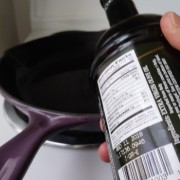The secret to really good olive oil
How to spot it, store it, and why it matters
– By Margo L, neighborhood Market Manager
Using a really good olive oil matters because it’s as good for you as it is delicious. Good olive oil is the secret to the nutritious Mediterranean diet, which is associated with long life. The health benefits? Olive oil fights inflammation and osteoporosis, reduces the risk of cancer and diabetes, slows the aging of the heart, protects against depression… and the list goes on! (Read more about the health benefits here.)
Plus, a good olive oil can enhance flavors and make your fresh delicious local produce even more mouth-watering. But a bad olive oil can knock it down to “Meh” or even “Blech!” So here’s the secret to finding a good one and keeping it that way.
1. Go extra virgin
It’s the highest standard for olive oil, regulated by various organizations, including the International Olive Oil Council. To be considered “extra virgin olive oil”, the oil should have no defects and must be unrefined, meaning it has never been treated with chemicals or heat.
2. Start fresh
Look for the “bottled on” or “best before” date. Look closely at the label in the photo with this post: See where it says “BBD 11 2018”? That’s the Best Before Date, November 2018, and that means it was pressed recently — fresh, and good for you, too. If you can’t find a date, keep shopping. You want to be able to use it all within a year or less of pressing. If you just can’t get your hands on olive oil with a date, buy only as much as you can use within 2 months and use it with abandon!
3. Protect your EVOO from HALT
Translation: Store and use your extra virgin olive oil (EVOO) in a way that will protect it from heat, air, light, and time (HALT). This will preserve its healthful properties and keep it from becoming a health hazard full of free radicals. The fact is, oils are fragile. The four elements of HALT break it down and create free radicals, which eventually lead to excessive oxidation and rancidity. Rancid oil will leave a bad taste in your mouth… and worse: While it doesn’t pose a food-safety type of health risk, rancid oil harms cells, uses up precious antioxidants, and contributes to heart disease and cancer. The thing is, rancidity can set in long before you can taste it or smell it. So pay attention to those pressing and bottling dates!
4. Use the right storage container
The best storage containers are made of either tinted glass (to keep the light out) or a nonreactive metal, such as stainless steel. Avoid most plastic, too. Oil can absorb noxious substances such as polyvinyl chlorides (PVCs) out of the plastic. Containers also need a tight cap to keep out unwanted air. Experts recommend storing oil at 57 degrees, the temperature of a wine cellar. A room temperature of 70 degrees will be fine, though, as long as it’s away from heat sources like your oven or stovetop.
ABOUT SEASONAL ROOTS
Since 2011, Seasonal Roots’ online farmers market has connected Virginia families with local family farmers who use sustainable, humane practices. Our veggie fairies – mostly moms who believe in living better through scrumptious, healthy eating, being kind to animals, protecting the environment, and spreading joy – home-deliver freshly harvested produce, eggs, grass-fed dairy and meat, plus artisan fare. We empower our members to eat better and live better with more nutritious, flavorful food that’s good for us and good for the planet. More info at seasonalroots.com.


